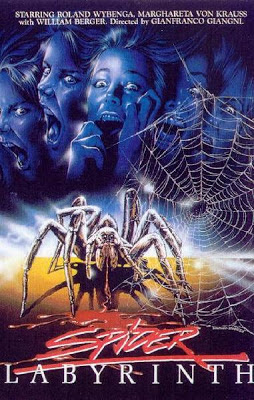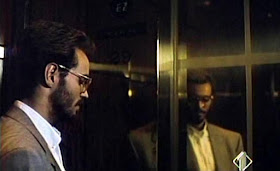This is a wholly dark and wicked Italian
Horror that lacks any kind of sense of humor and is just as keen on exciting Lovecraft and Argento fans as it is at trying to disturb them. The horror set
pieces and visual effects by Sergio
Stivaletti, which if used in any other movie would’ve screamed campy ‘80s, are
creepy and, at times, capable of stimulating a freaked-out experience, more so
than expected. While the horror sequences themselves are exceptional, it’s the demented
tone of the film that makes them work in a manner that penetrates the psych in
unsettling ways.
The film score consists of a lounge cue and a bevy of
traditional orchestral pieces that while making the film less quirky,
nonetheless, distinguishes it from the more rock/synth laden soundtracks of its
Italian horror contemporaries. The sound effects used to represent the snarling
and growling from the spider-witch in the film was probably a bit much,
sounding a lot like an agitated critter, but still nonetheless contributed to
one of the more brutally insane killer witches (wickedly and quite energetically played by Margareta von Krauss) I’ve seen on screen.
Wybenga as Alan has a little bit of a
flat affect, but he still pulls off the young, naive, bearded professor look
pretty well. His superiors send him to Budapest to find out why they haven’t
received a final report from a Professor Roth working on a top secret project
of extreme importance. To supply some foreboding, there’s apparently something
they seem to know about Alan’s destination that he doesn’t, mentioning, in
Alan’s absence, risks and it being all the better that he is naive to the
situation. Further supplementing this oppressive foreboding is a recurring nightmare
depicting a childhood memory of Alan being trapped in a wardrobe with a spider,
a symbolic suggestion that the protagonist might also be destined for or,
through dreams, unknowingly drawn to what awaits him on his journey.
Since this
is the movies, Professor Roth’s assistant that Alan meets up with upon arrival
in Budapest happens to be an attractive young lady, Genevieve (Paola Rinaldi), who naturally is a
potential love interest. But of course for now Alan is all business and his
main focus is on meeting with Professor Roth.
For some viewers The Spider Labyrinth can be a fun game
of spot the influences, starting with Alan’s arrival to a courtyard outside of
Roth’s residence, as a visual of a strange kid on a swing becomes reminiscent
of Mario Bava’s Kill, Baby Kill. Further implementing the Lovecraft angle, Alan discovers the professor at his home,
paranoid, changed, and possibly a little crazy from the strange outcomes and
discoveries of his research.
The movie almost starts to feel like an additional unofficial
entry in Argento’s The Three Mothers trilogy once the
setting shifts to the hotel Alan is staying at, especially when the hotel owner, Mrs. Kuhn (Stephane Audran),
emerges as a witchy looking, almost suspicious woman holding a black cat.
There, Alan spends some time in his room attempting to understand his colleague’s
notes and photos, and he also finds himself confronted with some bizarre
behavior from Genevieve, as she can be seen seductively exhibiting herself in
the nude from her window in Professor Roth’s quarters across from Alan’s room.
Furthermore, the Gothic communal bathhouse where Alan and Genevieve spend some time
getting to know each other is a marvelous filming location that gives further solidification
to the believability of the strange world both Alan and the viewers have
suddenly found themselves in.
The atmosphere becomes likably surreal in a
dreamy dinner scene at the hotel, with servers and strange hotel patrons at
neighboring tables looking unapprovingly and nervously at Alan as he discusses
his purpose and upsetting experience thus far in Budapest, with Genevieve. I sometimes get a strange and peculiar feeling when I come into a crowded
restaurant and, after not paying much attention for a while, become startled to
see that nearly everyone’s cleared out, after eating and getting lost in
conversation with whomever I might be dining with. That same scenario happens
in the film as everyone eventually clears out, leaving Alan and Genevieve alone
in the once populated dining area. It’s a nice touch of isolation that I was
able to relate to.
There’s a particular kill scene done with a lot of style and
panache at the hotel that’s comparable to Argento’s
Inferno when a paranoid and now
hopelessly doomed character, Maria (Claudia Muzi), finds herself fleeing from a homicidal witchlike
creature and her far reaching powers in the hotel’s labyrinthine passage ways.
White sheets make up the weaving hallways like a spider web with numerous arms
reaching out at her as she flees, panic-stricken and terrified, before getting trapped
in the web, like an insect, as the spider-witch emerges and goes in for a cruel
kill, plunging a knife into the facial outline of the victim pressed against
the white sheets.
The only member of the cast I recognized was William Berger (Five Dolls
for an August Moon) playing a, seemingly to Alan, paranoid, crazy old man
on the streets who seems well aware of Alan and his peril, warning him to not
continue his investigation any further for his own sake. This
man may remind some viewers of another knowledgeable old vagrant in Lovecraft’s The Shadow over Innsmouth.
Ultimately, things take a climactic turn
in a hellish underground lair that feels nicely influenced by the underground
tomb in Fulci’s Gates of Hell with events leading up to an intense cult conspiracy
style gathering with freaky supernatural outcomes involving a spider baby god
and a ghoulish transformation visual effect that is so crazy it becomes
forgivable that it was kind of ripped off from The Thing.
The Spider
Labyrinth is recommended for the patient horror fan with a taste for Argento and Lovecraft influenced filmmaking with hopes to be proven wrong in
their belief that the late ‘80s were a bland time for Italian horror.









You had me at 'Lovecraftian origins'. Then you sealed the deal with the comparison to Argento's Inferno. This just moved to the top of my must see list.
ReplyDeleteThanks for your comment, Jonny! The Spider Labyrinth is a little on the dismal side, but if you dig Inferno; you should have no trouble getting into this.
DeleteYeah, I see The Thing influence in there. I also felt, in a funny way, it reminded me of Short Night of Glass Dolls.
ReplyDeleteThe part with the transforming baby was great, but after re-watching the spider-head scene from The Thing, I thought it was just a little too similar, especially the way the neck stretches. The "cult conspiracy" element felt in Short Night is definitely present here, as well.
DeleteI've never even heard of this title before. I'm with Jonny - it just shot from "never heard of it" to "must see" in the time it took me to read your post. A comparison to Argento will always seal the deal for me. Great post.
ReplyDeleteThanks, Brandon! Heh heh, I guess that's Argento for ya. I haven't covered an Argento title in a while, and I really should again, soon, because the two I have seem to be popular (traffic-wise) here. Currently, I'm debating between Opera and Tenebre.
DeleteAs for Spider Labyrinth, it reminds me mostly of Inferno, and there's a little bit of a Mario Bava touch in there as well.